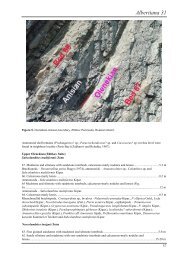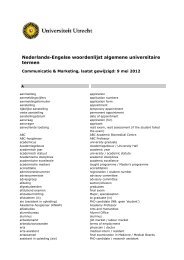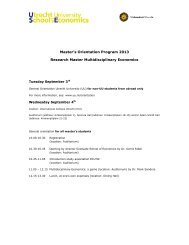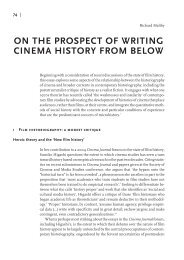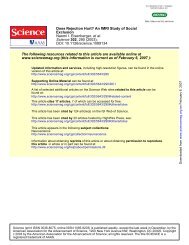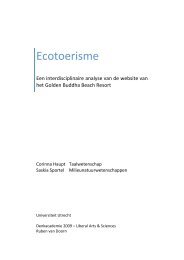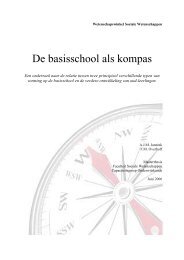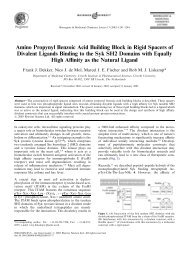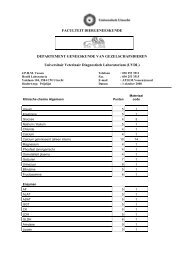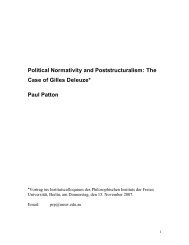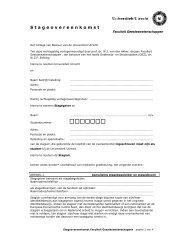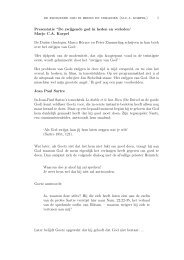Chapter 11
Chapter 11
Chapter 11
Create successful ePaper yourself
Turn your PDF publications into a flip-book with our unique Google optimized e-Paper software.
Non-State Actors: Organized Crime, HumanRights NGOs and the United NationsAlex P. Schmid *`Transnational Crime undermines the very foundations of the internationaldemocratic order. Transnational crime poisons the business climate, corruptspolitical leaders and undermines human rights.'Boutros Boutros-Ghali, Secretary-General, United Nations. 1AbstractThis chapter elaborates some differences and similarities between two types ofNon-State Actors: Non-Governmental Organizations (NGOs) and TransnationalCriminal Organizations (TCOs). It discusses definitional issues and takesLissner's typology of NGOs as a framework for highlighting relations betweensome governments and organized crime. It also discusses human rightsviolations committed by TCOs. In his conclusion, the author suggests thathuman rights NGOs should extend their concern about violations beyond Stateviolations and those of guerrilla and terrorist movements and incorporate alsothose of organized crime. An appendix lists major transnational criminalorganizations.1. NGOs and TCOs: Some Analogies and DissimilaritiesWhen we think of NGOs we tend to think of them in predominantly positiveterms: idealistic Non-State Actors that pick up some of the pieces broken byState Actors in the game of nations. While this is, to varying extent, true formany NGOs in the field of human rights, it is not true for all. For me it was aneye-opener to see at the 1993 United Nations (UN) Conference on HumanRights how mixed a crowd human rights NGOs are. PIOOM had the legal statusof an `official observer' and had an information booth next to many other NGOsin the big tent outside the Vienna Conference Centre. From where I stood I*1Professor University of Leiden and Coordinator of the Interdisciplinary ResearchProgram on Human Rights Violations (PIOOM).United Nations Press Release (UNIS/CP/NAP/6), Secretary-General in Address toWorld Ministerial Conference in Naples, Calls for Effective International Action against`Crime Multinationals, United Nations, Naples, 21-23 November 1994, p. 3.
128 SIM Special 19Critics have blamed NGOs for `lack of accountability, mutualcompetitiveness and poor coordination' in their work in the field. 5 The sameargument was true for organized crime. Yet there are some ominous signs thatcrime cartels are dividing up the world and its markets. 62. The Wealth of TCOs and the Poverty of NGOs and the UNClearly, there are also big differences between organized crime and humanrights NGOs. The latter are non-profit organisations while the first are mostemphatically engaged in profit-making. The combined resources of NGOs areestimated as being between USD 9-10 billion; that is the amount all NGOsspend annually on humanitarian assistance. 7 The benefits from this moneyreaches some 250 million people. TCOs, however, make more money and567J. Bennett, Meeting Needs: NGO Coordination in Practice, Earthscan, London,1995, p. xii.The Italian Minister of Justice, Alfredo Biondi, in his speech to the Naplesministerial summit on transnational organized crime, pointed out: `When the BerlinWall fell we all to a greater or lesser degree drank to the beginning of a new era (...)What many people may not know is that while this new Europe was being born inDublin, another summit meeting was being held in the former East Berlin between thebosses of organized crime from all over the continent (...) There has even been talk ofan international Mafia with far-reaching tentacles that is able to control or at leastcondition politics in various nations. There is no definitive evidence of this one way orthe other. And yet, a disquieting fact has not escaped the international investigativeagencies: there have been fewer conflicts between criminal organizations in preciselythose areas where their respective interests overlap or coincide. Has an internationalpax Mafiosa been declared? Has a new pact been forged between Colombians, Sicilians,Russians and so on to share the `areas of influence'? As I have already said, we cannotknow for certain. What is certain is that the situation is alarming. The Mafia grew aboveall in the seventies, when it became virtually an international holding company.Through its control of the narcotics traffic, it managed to enter the huge arms marketand also the world of financial crime. With the fall of Communism in Eastern Europethis growth has rocketed. The explosion of ethnic conflicts, the disappearance ofbarriers in Europe, the mass migrations and the dismantling of entire national economicand industrial systems all offer the criminal organizations precious and uniqueopportunities to acquire power and wealth.' – Alfredo Biondi, Minister of Justice,`Naples, the Decisive Date', in: Contro. Against Drugs Trafficking, Smuggling, SecretArms Dealing, Money Relaundering, Gambling-Dens, Illegal Immigration, AGI,Naples, 1994, p. 21.Bennett, op.cit. (note 5), p. xi.
Schmid / Non-State Actors: Organized Crime, Human Rights NGOs and the UN 129distribute it to fewer people. The Chinese Triads alone – with more than 300,000members abroad – are estimated to bring in USD 200 billion a year fromextortion, prostitution, heroin, alien smuggling, entertainment, the media andbanking. 88United Nations, World Summit for Social Development, Department of PublicInformation, Crime Goes Global, Copenhagen, 6-12 March 1995, p. 1.
130 SIM Special 19Figures on the budgets of TCOs vary widely and are not very reliable.According to the President of the Italian Banking Association, TancrediBianchi, around 1,000 billion illegally obtained US dollars have been launderedby criminal groups through the international financial circuit. 9 The cash-cow oforganized crime – drug trafficking – alone is estimated to be worth USD 500billion a year – more than the global trade in oil. 10 In 1995 a UN document cameup with a figure that puts the sales by organized crime syndicates at USD 750billion (see Table 2).Table 2:The wealth of crime syndicates compared with countries and regionsIn the Netherlands, the annual international business of Dutch criminals in softdrugs alone has been estimated by Dutch police, fiscal and custom offices asamounting to USD <strong>11</strong>.4 billion. <strong>11</strong> That is already more than what all NGOs in theworld are estimated to spend for humanitarian assistance.910<strong>11</strong>`An interview with Tancredi Bianchi, President of the Italian BankingAssociation (ABI)', Contro, op.cit. (note 6), p. 79.Williams, loc.cit. (note 3), p. 99.NRC-Handelsblad [Dutch newspaper], 1 September 1995, p. 3.
Schmid / Non-State Actors: Organized Crime, Human Rights NGOs and the UN 131In the 1970s researchers presented statistics on how large somemultinational corporations are in comparison with States. General Motors anddozens of other multinational corporations turned out to be richer than manycountries. Such a comparison can also be made with organised crime. 12 TheUSD 750 billion in Table 2 are almost equal to the USD 767 billion that 185Member States of the UN spend annually on military defense.TCOs easily outrun the wealth of NGOs and the wealth of the UNorganization.Let us briefly look at the costs of the UN. Its core functions in New York,Geneva, Vienna and Nairobi and the five regional commissions cost, includingthe salaries of 10,700 employees, USD 1.2 billion annually. In addition to thecore functions, the UN also run peace operations in places like the formerYugoslavia, which cost another USD 3.2 billion in 1994. If one adds theprogrammes and organs related to the UN core functions, another 33,000people work for the UN, costing another USD 6.3 billion. If the entire UN familyis included – the International Monetary Fund, the World Bank, the Food andAgriculture Organization, the World Health Organization etc. – one ends upwith a total of 61,400 employees at annual cost of USD 18.2 billion. 13 The UN isconstantly on the brink of financial bankruptcy due to the fact that manygovernments are unable or unwilling to pay their dues.This is not to say that organized crime has not also had financial problems.Consider the Italian Mafia for example. Since the four main Mafia organizationsin Italy (the Sicilian Mafia, the Camorra in and around Naples, the `Ndranghetain Calabria and the Sacra Corona Unita in Puglia) had to pay a great manylawyers to defend so many of their accused members and since the Italian Statehas confiscated sizeable chunks of Mafia property, organized crime in Italy hada bad year in 1995. According to figures from the Italian Minis tries of theInterior and Justice, the Italian Mafia had a loss of USD 78 million in the firstfour months of 1995. However, in 1994 it made an estimated net profit of USD1.5 million. The total business of the Sicilian Mafia, the Camorra, the`Ndrangheta and the Sacra Corona Unita was estimated as being worthbetween USD 15 and 18 billion. Approximately one-third of this is untaxedprofit. Yet from the overall gain of USD 5.4 billion not only the salaries of 25,000mafiosi had to be paid but also the services of others in their network, including1213United Nations, op.cit. (note 8), p. 3.Figures from Gareth Evans, `A Struggling UN Must Now Appreciate the Art ofthe Possible', International Herald Tribune, London, 7 October 1994.
132 SIM Special 19judges who hand out light sentences for convicted mafiosi. Each mafioso isestimated to have between 10 and 30 other people whose collaboration, silenceor information has to be paid with some favours. To grease that wider networkabout USD 1.35 billion are judged to be necessary. To help the Mafia hasbecome more risky in recent years and it is therefore more expensive to maintainthat front network.According to the Italian paper Il Mondo, these costs have risen by 30percent in 1995. Add to this the costs for all the lawyers to be hired to defendmore than 4,000 arrested suspected mafiosi and to try to bribe judges and youhave another USD 330 million in expenditures. The Italian State had confiscatedMafia property to the value of almost USD 3 billion in 1994 and 1995, including,for instance, the 124 apartments, 21 villas and 32 cars of the arrested mafia bossToto Riina. If the Italian Mafia had not horded money in tax paradises abroadand could not draw on these reserves, it would have serious financial problems.Having lost political protection after the fall of the Christian Democrats, theItalian Mafia also faces competition from, among others, the Russian Mafia inthe heroine and cocaine market, according to the Italian police. 143. DefinitionsWhile both NGOs and TCOs are Non-State Actors, they are defined verydifferently. The official ECOSOC definition of an international NGO withconsultative status is that`The organization shall be of representative character and of recognizedinternational standing; it shall represent a substantial proportion, and express theviews of major sections, of the population or of the organized persons within theparticular field of its competence, covering, where possible, a substantial numberof countries in different regions of the world.' 15A human rights NGO, in turn, has been defined as one that:should have a general international concern with this matter, not restricted to theinterests of a particular group of persons, a single nationality or the situation in a1415Figures from Marc Leijendekker, `Zaken Italiaanse mafia gaan slecht' [Badbusiness for the Italian Mafia], NRC-Handelsblad, 15 September 1995, p. 12.R. Brett, `The Role and Limits of Human Rights NGOs at the United Nations',Political Studies, Vol. 63, 1995, pp. 96-97.
Schmid / Non-State Actors: Organized Crime, Human Rights NGOs and the UN 133single State or restricted group of States. 16What distinguishes a human rights NGO is that it does not serve its ownnarrow group interest as, for example, a trade union does, but that it seeks toimprove the human rights enjoyment for a wider group, if not for all of society.Crime, by its very nature, does not aim at distributing its ill-gotten businessprofits so widely. In analogy to Clausewitz's definition of war as a continuationof politics by other means one could define organized crime as a continuationof business by other means. This type of business can be unethical in twoways:1) the markets are illegal, for example, in the field of child pornography,prostitution, clandestine immigration, counterfeit, credit card fraud,gambling, loan-sharking, extortion, car theft, traffic in body parts, armssmuggling, proliferation of nuclear material; and/or2) the methods of operation in legal or forbidden markets are illegal. Hazardouswaste, for instance, is disposed of improperly by criminal organizationsposing as waste disposal and cleaning corporations. TCOs use crime forbusiness. Blackmail, extortion, kidnapping, threats and violence aremeans to acquire, maintain and defend illegal and sometimes legalmarkets. Opponents and competitors are coerced, corrupted orliquidated.While there is still no universally accepted definition of `organized crime', theGlobal Action Plan against Organized Transnational Crime, adopted at theWorld Ministerial Conference in Naples in 1994, listed the following sixcharacteristics of organized crime:1) group organization to commit crime;2) hierarchical links or personal relations which permit leaders to control thegroup;3) violence, intimidation and corruption used to earn profits or controlterritories or markets;4) laundering of illicit proceeds both in furtherance of criminal activity and toinfiltrate the legitimate economy;5) the potential for expansion into any new activities and beyond nationalborders; and6) cooperation with other organized transnational criminal groups.16ECOSOC Resolution 1296, paragraph 17, cited in Brett, loc.cit. (note 15), p. 97.
134 SIM Special 19
Schmid / Non-State Actors: Organized Crime, Human Rights NGOs and the UN 135An earlier UN General Assembly document of 1993 defined `organized crime' as`a form of economic commerce by illegal means, involving the threat and use ofphysical force, extortion, corruption, blackmail and other methods, and the useof illicit goods and services.' 17`Dirty business' is not confined to organized crime; the secret services ofrogue States, and sometimes democratic States as well, engage in it and bonafide businesses at times also take recourse to tactics like bribing or strikebreakingby armed gangs. Yet while the use of such instruments is exceptionalwith legitimate business and with democratic States, the use of illicit tactics isstandard operating procedure for organized crime. Organized crime has a legalfront organization – commercial, political, religious, philanthropic – mainly forcamouflage and whitewashing; the legal part of its business is exceptional.The differences between NGOs and TCOs then are very clear. A commondenominator for them can only be found on a higher level of abstraction andwith regard to their international reach. For this, the definition that SamHuntington proposed for transnational organizations seems to be fitting:`[organizations] conduct(ing) centrally directed operations in the territory of twoor more nation-States, (which) mobilize resources and pursue optimisingstrategies across national boundaries, (which) are functionally specific, and seek topenetrate and not acquire new territories.' 18If we take `territories' also to include `markets', this definition describes some ofthe common ground of both types of Non-State Actors.4. Typology Based on the Relationship between State and NGOs/TCOsHaving looked at definitions, let us turn to a typology. As objects ofcomparison for transnational organized crime, we can take either legitimatemultinational corporations or governments. For the purpose of this volumewhere the position of NGOs vis-à-vis governments is a matter of concern, thelatter is more appropriate. There is a typology of NGO-governmentrelationships by Lissner which is reproduced below. It can be used as a kind ofsounding board to make some remarks on the relationship between1718United Nations, General Assembly, Ninth United Nations Congress on thePrevention of Crime and the Treatment of Offenders. Discussion Guide, UN, Vienna,1993, A/Conf.169/PM.1, 27 July 1993, p. 8.Cited in Williams, loc.cit. (note 3), p. 100.
136 SIM Special 19Transnational Organized Crime and governments. National organized crimesyndicates often depict themselves as a parallel shadow- or counter-State.In both cases – NGOs and TCOs – various kinds of relationships withgovernments exist. Lissner has identified six types of NGO-governmentrelationships with regard to bona fide NGOs. I list them here and will, in eachcase, see whether there is some equivalent when it comes to TCOs.Table 3Six Types of NGO-Government Relationships 191) The `subservient' role requires the NGO to accept any governmentrequest, with no critical questions asked. The NGO would thus befully loyal to its own country's foreign policy objectives anddirectives, and it would fully respect the host country's laws,directives and priorities, – or it would be subservient to one or to theother.2) The NGO `partnership' role is one of complementing or supplementingdonor governments' programmes. Rather than a relationship ofdomination or rivalry, government and NGO cooperate willingly.Partnership may also extend to the relation between the NGO and therecipient government.3) The `compensatory' role concept emphasizes the importance of NGOshelping people who have become victims of governmental mistakes,unwillingness and/or inability to help. While the NGO realizes thegovernment's inadequacy, it does not openly criticize the government.4) The `corrective' role is characterized by a conviction that NGOs are`the voice of the voiceless': the NGOs have expertise, they haveinformation about human suffering in various parts of the world, andfor this reason, they are responsible for defining needs and pressuringgovernments into correcting harmful or unsatisfactory policies. Thisrole could also be construed as `constructive advocacy'.5) The `disobedient' role is adopted by NGOs that put a premium on theirown values and are indifferent to legalism. The ultimate loyalty of theNGO is not to positive law, which may be unjust, inhumane or19Jorgen Lissner, The Politics of Altruism – A Study of the Political Behaviour ofVoluntary Development Agencies, Lutheran World Federation, Geneva, 1977, pp. 206-216.
Schmid / Non-State Actors: Organized Crime, Human Rights NGOs and the UN 137obsolete, but to religious or moral principles concerning justice andhuman solidarity (...) The attitude of the NGO is reformist, notrevolutionary.6) Finally, the `subversive' role takes disobedience one step further, asthe conflict between the values of the NGO and the existing politicalorder will justify outright confrontation. This role has been assumedby NGOs involved in assistance to victims of human rights violations,or assisting populations fighting against their own government in`just' liberation wars. 20If we take this typology as starting point, and accept that many TCOs alsohave various types of links to those controlling State power we face a majorproblem when it comes to arriving at a joint UN Global Action Plan againstOrganized Crime. Let us look at some examples to illustrate how close the linksbetween the underworld and the upperworld can be. In doing so I will try tofollow roughly the six types of relationships in the above classification forNGOs and look for TCO equivalents.Ad 1: There are some regimes where the secret service engages abroad if not athome in organized crime as a way of financing itself; sometimes it is not clearwhether this is official policy or a side activity of individual members. NorthKorea, for example, was at one time short of foreign currency. It then allegedlyprovided diplomats with narcotic drugs which they were expected to sellabroad in order to raise cash to cover embassy costs abroad.Members of other secret services operating abroad sometimes also see anopportunity to make some money with crime. We find ex-agents of the CIAdoing business with Colonel Khaddafi and Israeli ex-agents providing weaponsto Colombian drug lords. Members of Tito's Yugoslavian secret service fightingopposition groups abroad have also engaged on various forms of organizedcrime. Some of the prominent figures among Serbian warlords still have acriminal record in some West European capitals and one of them, `Arkan'(pseudonym for Zeljko Raznjatovic) who is wanted for bank robbery as well asgenocide is even rumoured to control the Yugoslavian Mafia in Amsterdam tothis day. There are also some indications that the Chinese Triads and somemembers of the consular service of the Government of Taiwan are intimately20Idem.
138 SIM Special 19linked. 21Another example is the former Dutch colony Suriname, which was ruled inthe 1980s by Colonel D. Bouterse. He did not only make sectors of the Statesubservient to his cooperation with Colombian drug producers, he alsoattempted to corrupt police officers in Amsterdam and tried to infiltrate anumber of Surinamese men into the Dutch police forces as well as thegendarmerie at Amsterdam airport. Men of Surinamese origin at Schiphol'ssecurity service, as well as officials originating from Suriname working in Dutchtown halls were corrupted by Col. Bouterse to protect his cocaine line. 22 MrBouterse, who came to power in Suriname through a coup and was personallyinvolved in a massacre of political opponents, is now leader of the NationalDemocratic Party which has done well in the elections in Suriname in 1996. 23That secret services engage in lucrative criminal activities is no secret. TheIrangate scandal in the mid-1980s in the United States is an example of illegalarms trade by ex-intelligence agencies' operators as well as presidential staffmembers like Colonel Oliver North in the White House. The desire to makemoney has also brought the secret services of Iraq and Iran to producecounterfeited US dollars of near perfect quality to the value of USD 10 billion. 24In such cases, organized crime really is an extension of State power. TheState, or corrupt sectors thereof, provide shelter, impunity, diplomatic immunityabroad and offer logistical and other infrastructures to organized crime. Thatsituation exists in dozens of States. An example would be Pakistan where itssecret service and those running the Bank of Credit and CommerceInternational were closely interacting.Ad 2: If we substitute NGO for TCO, it is not difficult to find examples for thistype of relationship. Such a use of organized crime has, for instance, beenrecorded in the case of the American landing in Sicily in 1943. The US military21222324The evidence is often circumstantial. When a Chinese journalist in Californiacriticized the Taiwanese Government, the United Bamboo Gang, a Taiwan-based Triad,killed him in 1986. Williams, loc.cit. (note 3), p. 103. In Austria, Chinese organizedcriminal activities have been traced to a Taiwanese consular office.F. Bovenkerk, `In testimony before the Van Traa Commission, NRC-Handelsblad, 7 September 1995, p. 7; ibidem, 8 September 1995, p. 7.Jos Slats, `Bouterse als staatshoofd is niet meer te arresteren' [Bouterse cannot bearrested as head of State], Vrij Nederland [Dutch Weekly], 19 August 1995, pp. 7-8.Linnea P. Raine and Frank J. Cilluffo (eds.), Global Organized Crime. The NewEmpire of Evil, Center for Strategic and International Studies, Washington DC, 1994.
Schmid / Non-State Actors: Organized Crime, Human Rights NGOs and the UN 139sought the cooperation of the American Cosa Nostra to use their links withtheir Sicilian counterpart to facilitate their landing on Sicily. Mafia leadersimprisoned by Mussolini were liberated by the American forces and eveninstalled as mayors of Sicilian towns. The American-Italian Mafioso VitoGenovese became the interpreter of the governor of the American occupationforce. 25 Charles `Lucky' Luciano, the undisputed boss of the American CosaNostra in the 1930s, had been instrumental in bringing this partnership aboutand was allowed to leave a US prison after the war and spent the rest of his lifein Italy.A partnership with transnational organized crime could, in more recent times,be found in Panama where General Manuel Antonio Noriega did business withcertain Colombian traffickers while arresting their competitors and extraditingthem to the US Drug Enforcement Agency. In the case of Bolivia, the drugtraffickers managed to overthrow President Lydia Gueiler with the help of `their'General, Garcia Meza, in the early 1980s. 26Political partnerships are in many cases also business partnerships. Aproduct of such a partnership is the Colombian airline Lineas Aereas El Dorado.It was founded in 1980 by Gilberto Rodriguez Orejuela who was, until his arrestin mid-1995 a leading member of the Cali cartel, and by Gustavo de Greiff, theColombian ambassador in Mexico and formerly Minister of Justice of Colombia.In the case of Colombia, the Cali Cartel financed USD 6 of the <strong>11</strong> million whichpresidential candidate Ernesto Samper (Liberal Party) had at his disposal to winthe elections. 27 According to computer tapes confiscated in Cali, 2,800government officials were on the Cartel's payroll. Partnerships have also beenestablished between Colombian Cartels and guerrilla organizations. 2825262728Marc Leijendekker, `Wie zijn ziel aan de mafia verkoopt krijgt haar niet meerterug' [Whoever sells his soul to the mafia will have lost it for good], NRC Handelsblad,23 September 1995, p. 1 (supplement).Andres Benavente Urbina, `Drug Traffic and State Stability', North-South, 9August 1992, p. 35.El Espectador (Bogota), August 1995; Reinoud Roscam Abbing, `Proces wegensdrugsgelden tegen ex-minister Colombia' [Drugmoney trial against former ColombianMinister], NRC-Handelsblad, 29 August 1995, p. 5.`The way drug traffickers and guerrillas work together is fairly simple to explain.The traffickers pay large amounts of money to guerrilla organizations for the freedomto operate in zones where those groups are strong.' In repayment, as stated in an articleentitled `La connexion latinoamericana del narcotrafico' [The Latin AmericanConnection of Drug Traffic] by Rensselaer Lee: `The insurgent groups give warning ofconfronted government forces to defend drug traffickers' plantations, laboratories and
140 SIM Special 19In addition, drug traffickers have formed their own political parties. InColombia, both the `Movimiento Latino Nacional', led by Carlos Lehder, andthe `Movimiento Civismo en Marcha', led by Pablo Escobar Gaviria were suchfront organizations. While the Medellin Cartel and the Colombian Governmentwere at war with each other, the Cali Cartel was, until recently, apparentlygetting along fine with three successive Colombian presidents from the LiberalParty: Virgilio Barco, Cesar Gaviria and Ernesto Samper. As long as Samperstays in power, those arrested are likely to receive mild sentences. 29 This typeof `Colombianization' we also find in other countries like Mexico where, duringthe Salinas presidency, Cartel leaders like Juan Garcia Abrego (Gulf Cartel) roseto great wealth. 30 The same process can also be observed in countries likePakistan.There are also silent partnerships. There are numerous small countries thatoffer their banking secrecy to their clients to avoid taxes and provide safehavens for all sorts of `funny money', from simple tax evasion to bribes, andmoney obtained by blackmail as ransoms for the release of kidnapped persons.Favourite countries for TCOs to store away funds in excess of their necessarycash include Austria, Cyprus, Liechtenstein, the British Virgin Islands, theCayman Islands, the Channel Islands, Panama, and the Netherlands Antilles. 31Patron countries of Caribbean tax paradises like the United Kingdom and theNetherlands seem to be very tolerant towards such practices. Perhaps, they293031airports.' Urbina, loc.cit. (note 26), pp. 34-37.NRC-Handelsblad, `President Colombia kwam aan de macht via drugskartel'[President of Colombia came to power with the help of a `drug cartel'], 5 August 1995,p. 5.NRC-Handelsblad, 12 August 1995, p. 4.Jack A. Blum, a US attorney and former Senate investigator, as quoted in Raineand Cilluffo op.cit. (note 24), pp. 22-36. As an example on how easy it is to transfer`funny money' from one country to another with the help of tax heavens, Bluminterviewed with a hidden BBC camera the chairman of a Cayman bank. Blum: `One ofthe things he offered me was a gold Mastercard that I could use that had no name on it. Icould put it in the wall anywhere in the United States to get cash, do transactions, makepurchases, and there would be no record of whose card it was or of the money foranyone who was looking for it (...) How did I pick this bank? Well, the BBC and Idecided we would take the one with the largest ad in the airline magazines en route to theCaymans. So this was not through some sophisticated tip from criminals.' Ibidem, p. 23;the Italians Bertucci and Roberto Memmo of the Mafia have been associated with thebank director C. Smeets, Director of Citco-group. Cf. D. Ilegems and R. Sauviller,`Bloedsporen' [Traces of blood], NRC-Handelsblad, 6 October 1995, p. 16.
Schmid / Non-State Actors: Organized Crime, Human Rights NGOs and the UN 141reason that as long as these Caribbean is lands can earn their own income, theyhave not to be subsidized by the distant colonial power. In addition to financialsafe havens where TCOs can launder and store the proceeds of their crimes,there are also countries that offer protection to wanted criminals. Prominentamong these are said to be Cuba and Cambodia.Ad 3: Organized crime syndicates provide services to their members, and, to alesser degree, to the community in which they swim like the proverbial guerrillaswims in the popular mass. For example, Pablo Escobar of the Medellin Cartelwas a `local hero' providing sport facilities to his town. The Pakistani-controlledBank of Commerce and Credit International (BCCI) engaged in all sort ofphilanthropic activities which served the purpose of confidence-building andimage-making so that criminal greed could be hidden under the mask ofaltruism. Another example of a philanthropy based on ill-gotten gains has beenthe late Japanese multi-billionaire Sasakawa who was an admirer of fascismbefore the Second World War, was suspected to be a war criminal in theSecond World War and who became a major figure of organized crime in Japanafter the war. 32Ad 4: To find an equivalent of TCO-government relationships of the `corrective'type I have to stretch the example. Organized crime often becomes active inareas where legitimate business and government do not step in for a variety ofreasons. An example is organ transplants. There is a huge market for bodyparts (kidneys, hearts, corneas, lungs, thymus organs, eyes and testicles, etc.)which cannot be satisfied by voluntary donors (e.g. victims of car accidents)only. Here organized crime has stepped in. Organized crime has not onlyplundered mortuaries without consent of relatives of those who died naturally,they have also kidnapped and killed people. There are also persistent rumoursthat they are engaging in `child farming', considering organs from youngorphans as spare parts in waiting to replace old organs of rich old people whoare not willing to wait until a legal organ transplant can be arranged for them.Producer countries in the body part business are reportedly Russia, Argentina,Honduras, India, Mexico and Peru while clinics in Germany, Italy and32Another example of philanthropist-cum-criminal is Paul H.K. Lai, a well-knownNew York businessman in Manhattan's Chinatown in New York. He befriended themayor of New York, Governor Cuomo while also being at the head of a Triade (TungOn). Douglas Frantz, `Portrait of Man as Mobster Stirs Community's Disbelief', NewYork Times, <strong>11</strong> July 1995, pp. B2.
142 SIM Special 19Switzerland are said to be involved as buyers. 33Another example where organized crime has stepped in is the travelbusiness. TCOs transport people with false or no documentation acrossborders for purposes of prostitution, entry into foreign labour markets, andprovide them with protection abroad against government prosecution forcommon or political crimes. These channels are also used by legitimate politicalrefugees.33United Nations, Ninth UN Congress on the Prevention of Crime and theTreatment of Offenders. Action against National and Transnational Economic andOrganized Crime and the Role of Criminal Law in the Protection of the Environment:National Experiences and International Cooperation. Working Paper prepared by theSecretariat, UN, Cairo, 1995, A/Conf.169/5, p. 13.
Schmid / Non-State Actors: Organized Crime, Human Rights NGOs and the UN 143Organized crime helps members of NGOs in distress to avoid arrest andsmuggles them out of the country. According to Jonas Widgren, formerundersecretary of State for immigration in Sweden and currently director of theInternational Center for Migration Policy Development in Vienna, professionaltraffickers have smuggled as many as a half-million illegal immigrants fromChina, India, Russia and other places into Western European countries, for feesranging from USD 250 to USD 25,000. 34 While half of the world's 24 millionrefugees are children and one-third are women, a disproportionably highnumber of refugees that come to the rich countries tend to be young males whocould afford the trip or were prepared to repay the costs of the trip bysmuggling, crime or quasi-slavery.Many refugees would never have reached Europe by legal means. Only bymaking use of false papers provided by organized crime for large sums, and byprivate transportation provided by organized crime have many victims of Staterepression managed to leave the country. After the Tienamin massacre and thesubsequent hunt on dissidents in the late 1980s, the old Chinese Triadsprovided some of the student leaders with the channels to Hongkong.The problem with organized crime's involvement in bringing refugees toEurope is that they exploit these asylum seekers, and that they are not bringinghere the most deserving but the highest-paying ones. It has been estimatedthat `Non-deserving asylum seekers and illegal entrants now account for morethan 50 percent of total immigration to main European countries as compared to25 percent some eight years ago'. Organized crime was, in 1993, estimated tohave a total income of between USD 5 and 7 billion from trafficking people. 353435Marlowe Hood, `Trafficking in Humans: Big Business in Europe', InternationalHerald Tribune, 3 January 1995, p. 5.Jonas Widgren, `Global Arrangements to Combat Trafficking in Migrants',Migration World, XXIII, No. 3, 1995, pp. 20 and 24. Widgren writes (p. 23): `As regardsthe illegal migrants arriving in Western Europe in 1993, approximately 15 to 30percent of those successfully managing to cross the green borders of the countries ofdestination could be estimated to have utilized the services of traffickers during at leastsome part of their journey. As regards the asylum seekers without founded claims(approximately 300,000), various evidence seems to suggest that the proportion ofthose who utilized the services of traffickers is probably somewhat higher (20 to 40percent). That implies that approximately between 40,000 and 100,000 of the illegalmigrants and some 60,000 to 120,000 of the nondeserving asylum applicants made useof the services of traffickers at some point of the journey (e.g., to obtain forgeddocuments, to pass the green border, or to receive general advice). This would amount toa total of 100,000 to 220,000 aliens who in 1993 irregularly arrived in Western
144 SIM Special 19Very often these are the same people that also deal in arms, drugs and women. 36The market of trafficking in people is bound to increase given the level ofconflict and poverty in large parts of the world. 37Ad 5: Again, I have to stretch the analogy to come up with an example of the`disobedient' type of TCO. Many of the major and older organized crimesocieties emerged from brotherhoods that have existed for centuries and havetheir own rules and rituals. Some of these brotherhoods have become legalpolitical parties, others continue to exist as respectable religious sects and yet3637European States with the help of traffickers.'For a glimpse into this world, see Marjon van Royen, `De kilte van de angst. Eenvlucht uit Servië' [The chill of fear: an escape from Serbia], NRC-Handelsblad, 3September 1995, pp. 1-2 (Supplement).A UN document notes: `It has been estimated that criminal organizations areattempting to smuggle as many as 1 million people a year out of poorer countries andinto wealthier countries (...) The more vulnerable persons among them, particularlywomen, are often forced into sexual slavery. Even those who arrive at their destinationoften owe money to smugglers and are forced to engage in criminal activities to pay offtheir debts (...) According to some estimates, migrants from China form only 20 percentof those in a pipeline that encompasses India, Iran (Islamic Republic of), Iraq, Pakistan,Romania, Sri Lanka and Sudan. Those in transit include 60,000 Chinese in Moscow,80,000 or more Africans and Asians in Romania and a significant number of migrants instaging areas such as Guatemala, the Netherlands and Spain.' United Nations,A/Conf.169/5, op.cit. (note 33), p. 10.
Schmid / Non-State Actors: Organized Crime, Human Rights NGOs and the UN 145others are social mutual self-help societies while others become disobedientrule violators and engage in organized crime. These four fields – the political,religious, social and criminal – sometimes become mixed up. When you find aTurkish or Kurdish Association abroad it might act in one or several ways,depending on time and circumstances. Some of their activities are legal, somenot, some moral, some not and the moral ones might not be always legal. Thischameleon image of such predominantly male societies, brotherhoods or lodgesmakes them less vulnerable to outside scrutiny. To be a member of such acommunity provides members with an alternative social security system, basedon solidarity, but it also exposes them to the danger of being instrumentalizedfor purposes of politics and crime.The Chinese Traids have, depending on circumstances (such as theJapanese occupation) been at times obedient and then again `disobedient' tothose holding State power, helping and hindering the official power holders.Both Sun Yat Sen, the father of the first Chinese republic of 1912, and MaoZedong, the founder of the Peoples' Republic of China in 1949, grew up andwere carried to power with the help of ancient secret societies. 38Mao subsequently tried to repress the secret societies but after his deaththey raised their heads again, supporting political dissidents.38Oskar Weggel, `Das chinesische Geheimbundwesen: Entstehung, Pervertierungund Internationalisierung' [Chinese Triads; the emergence, degeneration andinternationalization], China aktuell, Vol. 22, No. 9, September 1993, pp. 918-941.
146 SIM Special 19Ad 6: Again I have to stretch the analogy to come up with an example of a`subversive' type of TCO. In the case of Italy, we find that the Masonic LodgeP2 was a state within the State, linked to foreign secret services (the CIA), andlinked to the Mafia. At the time of this writing Italy witnesses the trial of GulioAndreotti in Palermo. The 76-year old senior statesman was for half a century atthe centre of political power in Italy. He is suspected to have been aninstrument of the Sicilian Mafia. The picture that emerges from the accounts ofcrown witnesses (pentiti) is not one of statesmen using the mafia for buyingvotes and killing rivals – though that too is part of the picture – but one of themafia dictating ministers what to do, with Andreotti obeying orders and findingways of having prison sentences reduced or annulled for those major Mafiamembers caught by the law enforcement system. 39These examples make clear that there are numerous types of links betweenthe `upper world' of governments and the `underworld' of transnationalorganized crime. These links provide some TCOs with virtual immunity in thosecountries where they have such a cosy relationship with those in power. 405. Organized Crime and Human Rights ViolationsAs long as the State was successful in holding the monopoly of violence,human rights violations affecting life integrity could comfortably be claimed tobe the responsibility of the government. The claim of the State to have themonopoly of violence has, to varying degrees, always been a fiction. With therise of guerrilla movements, terrorist organizations and vigilante groups, wehave also become accustomed to see such organizations as human rightsviolators. Today, it can be argued that human rights violations by criminalorganizations must also be included in the perspective of human rightsorganizations and monitored adequately. One of the top members of the Dutchsecret service, Nico van Helten, referring to the role of ethnic criminalorganizations in the Netherlands, called their activities `a threat to the rule of3940That is not to say that services were not rendered to each other. According tothe judicial authorities in Palermo, the mafia might have killed the Italian journalistMino Pecorelli in 1979 in Perugia to do G. Andreotti, the Christian Democratic Partyleader, a favour (the journalist had materials in his possession which allegedlyincriminated Andreotti). NRC-Handelsblad, 7 October 1995, p. 5.A.P. Schmid, `Organized Crime: Links Between “Upper World” and“Underworld”', UN Crime Prevention and Criminal Justice Branch, Vienna, 1992, p. 66.
Schmid / Non-State Actors: Organized Crime, Human Rights NGOs and the UN 147law'. 41 If this is so in one of the most stable and democratic countries on earth,how much more of a threat must it be to the majority of countries.Let me now sketch some fields where organized crime and NGOs and humanrights are opponents but also, sometimes, strange bedfellows.1) Organized crime syndicates use for their operation provisions of the law thatare protecting individual rights, like the right to privacy. The paradoxhere is that TCOs who themselves are major violators of human rightsuse the protection of the law to continue their illegal activities.Increasingly, their counsellors are seasoned lawyers – the best moneycan buy – who know all the loopholes and procedural tricks to preventthe bosses of organized crime from being sent to prison and losing theirill-gotten gains. In the Netherlands, for instance, 25 defense lawyershave been suspected to be in the service of organized crime. Some ofthem apparently did not only defend their clients retroactively but werealso active as pro-active legal advisers or councillors. 422) Tactics and practices used by organized crime are human rights violations.Extrajudicial executions are called liquidations. Torture to interrogateinfiltrators and informants or kidnapped victims is not unusual. Forms ofslavery are engaged in by organized crime. Foreign prostitutes withoutvalid permit to stay are often practically unprotected by the law. Thevictims, girls who have been lured into prostitution abroad, are in manycountries simply extradited when they present their case to the police.For the pimps and their superiors, such losses are no problem as theyfind ways to provide `fresh flesh' for the sex market. Threats of violenceagainst the families of caught prostitutes in the country of origin usuallyare effective enough to silence witnesses and victims of such crimes.Trafficking of women in Western Europe is increasingly in the hands ofthe Russian Mafia. In the Netherlands alone between 2,000 and 3,000women from Eastern Europe have been brought under false pretexts intothe country where they are forced to prostitute themselves before beingsold (for prices ranging from Dfl. 3,000- 10,000) to other pimps after acouple of months. 43Organized crime also causes human rights violations on a larger scale.414243Leids Dagblad [Dutch newspaper], 30 September 1995, p. 3.H. v.d. Bunt (Director WODC, Ministry of Justice), before the Van TraaCommission; NRC-Handelsblad, 8 September 1995, p. 7.NRC-Handelsblad, 7 October 1995, p. 3.
148 SIM Special 19The term `narco-terrorism' is a testimony to how close and strong thisconnection can be. During the 9th UN Congress on the Prevention ofCrime and the Treatment of Offenders in Cairo (29 April – 8 May 1995)evidence was presumed that TCOs were providing terrorist groups withtraining, financial resources, arms and assistance in the planning andexecution of terrorist operations and in the search for safe havens. 44 TheMedellin Cartel has bombed passenger aircrafts from the sky and killedhundreds of policemen, judges and ordinary people. The drugs thataddict people in the Western world buy cause few lethal victims here butmany in the countries of origins. Many civil wars – in Myanmar,Afghanistan, Lebanon, Nicaragua, Sri Lanka, Turkey, etc. – are for alarge part being financed by the sale of illegal drugs. Dutch hashishimporters have been buying large quantities of hashish from a Lebanesewarlord during and after the civil war. After the end of the Cold Warwhen Russian support for local liberation movements drasticallydiminished, drugs became an alternative source of income. The swap ofdrugs for arms is a classic type of barter trade by organized crime. 453) Organized crime can cause humanitarian disasters. Since the collapse ofcommunism, former KGB agents and figures from organized crime havetried to find markets for nuclear materials in the West and the MiddleEast. Multi-kilogram quantities of weapon-useable uranium have beenstolen from the Ministry of Atomic Energy fuel complex near Moscowand the submarine fuel depot in Murmansk.Weapon-grade Plutonium-239, enriched with Red Mercury, has found itsway to Germany. 46 There are over 100 sites where weapon-grade444546M. Joutsen, Fourth Session of the United Nations Commission on CrimePrevention and Criminal Justice, HEUNI, Helsinki, 14 June 1994, p. 4.The link between prostitution and drugs is also a close one. Lucky Luciano, bossof the American mafia in the 1930s came up with the idea of getting factory girls luredinto prostitution by hooking them on drugs. What they earned in brothels and on thestreet they would again spend on drugs the supply of which he also controlled. Inside theMafia, Special Issue, n.d.,n.p.,n.y., p. 27. In this case the crime of prostitution was selfdirected.It has been estimated that the average heroin user commits 200 crimes a yearto support his or her habit. Williams, loc.cit. (note 3), p. 107.According to a testimony of Hans-Ludwig Zachert, head of the German FederalPolice, there were, in 1992, `59 fraudulent offers of radioactive material, 99 casesinvolving illicit trafficking in such material and 18 seizures of such material. In 1993,there was in Germany a total of 241 cases, comprising <strong>11</strong>8 fraudulent offers ofradioactive material and 123 cases involving illicit trafficking in such material, and 21
Schmid / Non-State Actors: Organized Crime, Human Rights NGOs and the UN 149radioactive substances are stored in Russia and many nuclear deviceslike artillery shells have, in the words of one expert `no, or at bestprimitive, safety devices on them'. 47 The proliferation of plutonium,uranium, and so-called Red Mercury (`krasnajartoet' – Hg2SB2O7),apparently a nuclear-blast enhancing mercury-antimoon-oxide, has beenfacilitated by organized crime. 48 Louis Freeh, the director of the AmericanFederal Bureau of Investigation (FBI) has been quoted as saying: `[o]f allproblems of crime, organized crime and all possible illegal activities, whatworries me most is the proliferation of arms and nuclear equipment.' 49The nuclear materials formerly controlled by the KGB are now distributedin four States. The dismantlement of nuclear warheads currently involves1,500-2,000 warheads per year, a rate which, to produce nucleardisarmament, would mean another 15 to 20 years of continuingdismantling, with risks of theft, loss and accident. Worldwide, more than1,000 tons of plutonium also becomes, by the year 2000, available incivilian spent nuclear fuel, another source of potential criminal abuse. 50Nuclear blackmail is a possibility which causes nightmares to heads ofState. When there is no territorially-based opponent, deterrence doesnot work. It is not necessary to explode a nuclear device; all that isneeded for extortion is the credible threat of being able to cause panic bydispersing radioactive materials with conventional explosives or through47484950seizures of such material (3 of which involved material from Germany and not from theformer Union of Soviet Socialist Republics). In 1993, 545 suspects were identified, 47percent of whom were non-German, predominantly Czech, Polish and Russian nationals(...) On 10 august 1994, German police seized 350 grams of weapon-grade nuclearmaterial (mixed-oxide fuel for reactors, containing plutonium enriched to 87 percent)and arrested one Colombian and two Spaniards. Another incident, involving aconsiderably smaller quantity of nuclear material, but of the same quality, occurred twodays later.' Cited in: United Nations, A/Conf.169/5, op.cit. (note 33), p. <strong>11</strong>.Rensselaer Lee, `The International Black Market: Coping with Drugs, Thugs, andFissile Materials', in: Raine and Cilluffo, op.cit. (note 24), p. 81.Karel Knip, NRC-Handelsblad, 7 September 1995, p. 1 (supplement).In Contro, op.cit. (note 6), as quoted by Luciano Violante, Vice President of theItalian Chamber of Deputies, p. 41. Violante also refers to a secret agreement reached inthe late autumn of 1992 between the Sicilian Cosa Nostra and criminal groups in the oldUSSR with the aim `of developing a network through which nuclear components anddrugs produced in the ex USSR could be sold', ibidem, p. 42.Raine and Cilluffo, op.cit. (note 24), pp. 172-173.
150 SIM Special 19the water supply system in a population centre. 51 Iraq has been workingon such radiological weapons but has not been able to use them.Transnational Non-State Actors with no territory to defend cannot beinspected the way Iraq was after the Gulf War.Nor can TCOs using radiological bombs be deterred since there is nosingle territorial base to their activities.Transnational organized crime thrives because borders can be used as fencesto hide behind and serve as defenses to be penetrated in hit and run actions.While crime is international, criminal justice is, in the absence of a worldcriminal court, national and extradition procedures are slow and uncertain.Some countries like Cambodia have become favourite and safe resting zones forinternationally-sought criminals. The fact is that some governments have anactive interest to tolerate if not cooperate with members of organized crime.Money laundering is welcome in countries starving for foreign currency andfew questions are asked. This is not only true for Third World countries likeColombia but also for much of Eastern Europe.51The head of the FBI, Louis J. Freeh, recalled a conversation with the Presidentof Poland, Lech Walesa, who expressed great concern about such nuclear blackmail. L.J.Freeh, `International Organized Crime and Terrorism: From Drug Trafficking to NuclearThreats', in: Raine and Cilluffo, op.cit. (note 24), p. 3.
Schmid / Non-State Actors: Organized Crime, Human Rights NGOs and the UN 151In the case of Colombia, figures from organized crime have been able to undoextradition efforts by the Government of the United States by mobilizingnationalism. 52What can the UN do when there are Member States that profit, at least in theshort run, from their tolerance or backing of organized crime?In his opening address to the World ministerial Conference in Naples in1994, UN Secretary-General Boutros Boutros-Ghali called organized crime a`world phenomenon' which has spared no society. Literally he said:`Transnational crime poisons the business climate, corrupts political leaders andundermines human rights. It weakens the effectiveness and credibility ofinstitutions and thus undermines democratic life. When order is in retreat, andwhen law, morals and democracy are under attack, all kinds of criminal venturesand deviant behaviour may be spawned. This is what we are bound to worktogether to prevent.' 53In this fight against transnational organized crime, the UN can use all the helpthat they can get, including the one from NGOs.ConclusionHuman rights are protected or violated by States. That was the originalassumption fifty years ago when the UN were founded. In the 1970s therealization broke through that Non-State Actors like liberation movements andguerrilla and terrorist organizations were also torturing and killing innocentpeople. At the same time it was felt that NGOs could also play a significant rolein the protection of human rights.There is little controversy today that both governments and armed politicalopposition can be abusers of human rights. Yet we still tend to make adistinction between political human rights abuses and common crimes humanrights abuses.5253Williams, loc.cit. (note 3), p. <strong>11</strong>1.Boutros-Ghali, op.cit. (note 1), p. 3.
152 SIM Special 19It is worth pondering the question whether one should not also include, inthe universe of NGOs' human rights concerns, those violations that areperpetrated or facilitated by organized crime. While not all activities oforganized crime impact on human rights – such as activities in the field of illegalanimal trade, piracy, moving cattle across (African) borders, theft andtrafficking in cultural objects of art, counterfeiting, car theft 54 – a number ofthem do directly affect human rights, especially those involving sexual slaveryand trade in involuntarily obtained human donor organs. Other activities oforganized crime impact indirectly on human rights, such as those associatedwith narcotic drug trafficking. 55As the public is greatly concerned about criminal victimization and humanrights violations caused by TCOs, NGOs should consider whether they shouldnot also address these issues in a more systematic fashion.5455Russian crime syndicates are held responsible for an estimated quarter-millionstolen cars each year. United Nations, op.cit. (note 8), p. 1.A recent UN document stated: `There is abundant evidence that organized crimeis involved in the illegal arms trade and subversive activities that tamper with the rule oflaw in different parts of the world. The weight of evidence indicates that it contributesto the political turmoil and upheaval occurring throughout the world. Drugs for weaponsdeals have become common in the world of organized crime, and many ethnic andpolitical conflicts are aggravated by this unholy alliance.' United Nations,A/Conf.169/PM.1, op.cit. (note 17), 27 July 1993, p. 9.
Schmid / Non-State Actors: Organized Crime, Human Rights NGOs and the UN 153Appendix:Examples of Transnational Criminal OrganizationsAustralia: Italian mafia-type organizations (`Ndrangheta, Chinese Triads,Lebanse groups, Vietnamese gangs, Japanese Yakuza).Brazil: Comando Vermelho (CV or Red Command), Bicherios.Canada: Italian mafia, Colombian cartels, Chinese Triads, Russian mafia.China: Triads, of which 50 societies with 160,000 members are operatingout of Hongkong; the largest of these counts about 30,000associates. Prominent societies are from Taiwan and Hakka:United Bamboo's, Chao Tong. From Mainland China: Chingsocieties; Big Circle. For Chio Chao: Fuk Yee Hing, Sun Yee On,Gain Yee, Yee Kun. From Canton, the following are active inHongkong: Wo Grou, Wo On Lok, Wo Shen Wo, Wo ShenTong, The 14K, The Big Four and many others.Colombia: Various Cartels, including Medellin Cartel (formerly run by P.Escobar), the Cali Cartel (Gilberto and Gustavo RodriguesOrejuela), the Coast Cartel, the Asse del Caffe Cartel, the Nortedel Valle Cartel, the Ibague Cartel, the Santander Cartel and theBogota Cartel.France: Corsican groups in Marseilles. Sicilian groups in towns likeGrenobles.Germany: Turkish, ex-Yugoslav, Italian, Polish and Russian groups.Italy: The Sicilian Cosa Nostra (about 5,000 affiliates in more than 180Mafia families), the Naples-based Nuova Camorra Organizzata(about 6-7,000 affiliates in more than 100 clans), the Calabrian`Ndrangheta (about 5,000 affiliates in some 150 criminalassociations), the Puglia-based Sacra Corona Unita (some 50societies with 1,000 members).Japan: Yakuza (officially: Boryokudan – the `family'): more than 90.000members in more than 3,400 clans like the Yamaguchi-gumi (23-26,000 members), the Shmiyoshi-rengo (8,000 members), theIngawa-Kai (8,000 members).Mexico: A dozen Cartels, including the Gulf Cartel (centred in Tumaulipasand active in northeast and in southeastern United States), thePacific Cartel (in Jalisco and Sinaloa) and the Tijuana Cartel (BajaCalifornia).
154 SIM Special 19Netherlands: 30-35 criminal groups with characteristics of organized crime(according to C. Fijnaut)Nigeria: Academically trained members of the ruling class organized intribal and family gangs, engaged in cocaine and heroinesmuggling and international financial fraud, e.g. credit cards.Russia: Some 5,700 gangs of which 3,500 Mafia-style, of which at least200 organized with sophistication, with connections in 29countries abroad. A number of these groups are ethnic-basedfrom the Caucasus, the most famous being the Chechenya Mafiain Moscow until the Russian crackdown on Chechenya.UK: Chinese Triads, e.g. 14K, WoShing, Wo On Lok and San Yee On;Yardees, Jamaican crime groups active in United Kingdom.USA: La Cosa Nostra and other groups of Italian origin, Chinese Triads(e.g. Wo Hop To, United Bamboo, 14K, Sun Yee On), Vietnamesegangs, Japanese Boryokudan (Yakuza), Jamaican `posses', andKorean, Cambodian, Laotian, Taiwanese and Russian groups.Venezuela: Colombian organizations (Coke Investors, Coke Buccaneers,Poppy, Caribbean, Pan-american, Greek-Latin, Hispanic, Miami,Europe, Andes and Lebanese) and Italian organizations (e.g.Cuntrera-Caruna brothers).





